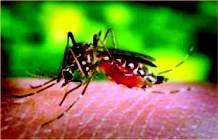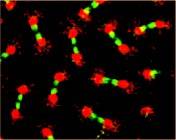
Recently, scientists have shown a way to prevent and, possibly, to eradicate dengue fever with the aid of a bacterium Wolbachia.
In two papers published recently in Nature, Australian researchers showed how female mosquitoes infected with the Wolbachia bacteria transmitted the bug to their offspring with ease, making them all dengue free and hence unable to spread the virus in humans.
The scientists claimed they have discovered a cheap and effective method of preventing the transmission of dengue fever. Until now, pesticides are being used to kill mosquitoes carrying particular types of viruses inside them but those contribute to only increasing the resistance of the mosquitoes to these chemicals. However, the newly discovered method gave rise to dengue-virus-resistant mosquitoes and they can be released in the wild to spread their population making the mosquito population of a particular region homogenous for the dengue resistant ones.

Wolbachia is one of the world’s most common parasitic microbes and is possibly the most common reproductive parasite in the biosphere. People with pets, especially dogs, should be familiar with Wolbachia. Wolbachia infects a variety of species, including many species of filarial nematodes (a type of parasitic worm), including those causing onchocerciasis (“River Blindness”) and elephantiasis in humans as well as heartworms in dogs.
Dengue fever, also known as breakbone fever for the intense joint-pain it causes, affects 50 million people a year in over 100 countries and can be fatal. Hospitalisation is often required, putting an enormous financial strain on poor communities in the tropics. Dengue is transmitted by the bite of the mosquito Aedes aegypti.
Scientists have rapidly replaced mosquitoes in the wild with skeeters that don’t spread the dengue virus. The trick from the scientists was infecting the Aedes Aegypti mosquitoes (the mosquito species that can harbour the dengue virus) with a particular kind of bacteria named Wolbachia. After that, they tested whether the virus resistant ones (infected with the Wolbachia bacteria) could displace their ordinary cousins in the wild, thus reducing and, in the future, may be removing the dengue spreading mosquitoes.



